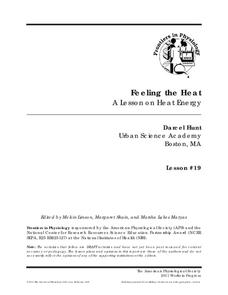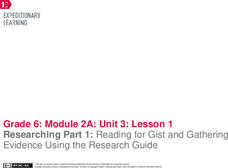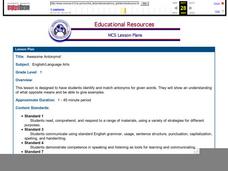Maryland Department of Education
The Concept of Diversity in World Literature Lesson 9: Debating Imperialism
To gain an understanding of Imperialism, class members read Rudyard Kipling's poem, "The White Man's Burden" and Mark Twain's essay, "To the Person Sitting in Darkness." Groups compare these perceptions of non-white cultures with the...
American Physiological Society
Did I Observe it or Infer it?
Take the mystery out of inquiry! When young scientists learn to use their keen powers of observation to make smart inferences about a situation, they are well on their way to understanding what the scientific method is all...
American Physiological Society
It’s the Heart of the Matter
Get the class jumping for joy with a fascinating look at matters of the heart. Learners perform physical tasks, collect and analyze heart rate data, and study conditions that affect heart health. Use the action-packed lesson...
American Physiological Society
What Environmental Conditions Lead to the Hatching of Brine Shrimp?
Will changing the environment in which brine shrimp live impact their reproductive success? Young scientists get hands-on experience studying the habitat of brine shrimp in a two-week immersion lesson. The teacher's guide provides all of...
American Physiological Society
How Does the Density of a Liquid Affect the Buoyancy of an Object?
Here's a lesson plan that will really float your boat! Introduce physical science scholars to the relationship between buoyancy and density through an assortment of individual and collaborative exercises. Lab groups work together to...
American Physiological Society
Why is Kettle Corn Cooked in Copper Pots?
The kitchen — it's not just for eating anymore! Specific heat is often a difficult concept to grasp, so give it context by relating it to cooking. Learners gain experience in the principles of thermal energy transfer by designing an...
American Physiological Society
Sit On It
How do product designers come up with the variety of things we see in stores and on TV every day? They identify a need, then create something that meets that need. Sounds simple, right? A two-week lesson puts seventh graders in...
American Physiological Society
Feeling the Heat
How do the changing seasons affect the homes where we live? This question is at the forefront of engineering and design projects. Challenge your physical science class to step into the role of an architect to build a model home...
Transforming Education
Social Awareness Strategies
What are the benefits of developing social awareness? Using the resource, readers learn strategies for fostering civil discourse, creating a participatory classroom, and enhancing family involvement. Scholars also take a personality...
EngageNY
Researching Part 1: Reading for Gist and Gathering Evidence Using the Research Guide
If only life came with an owner's manual. Pupils assemble with their research teams to discuss which of Steve Jobs' rules to live by most resonates with them. Scholars also read informational texts in pursuit of finding the gist and...
EngageNY
Launching the Module: Quotes about the Middle Ages
Pick a corner. Scholars receive a quote about the Middle Ages and then participate in a four corners activity by choosing a corner pertaining to their quotes. They then work in groups of three to discuss the bold words in their quotes....
EngageNY
Finishing Poster and Preparing for Gallery Walk
Practice makes progress! Using their drafts and resources from the previous lesson, pupils complete scientific posters for an upcoming gallery walk. Next, they practice presenting their posters to assigned partners.
EngageNY
Completing Reflection: Preparing a Poster for Presentation
Prewrite, plan, draft, revise, edit, share. Scholars complete a worksheet to reflect on how they used the writing process to improve their writing. They also draft plans for their scientific posters that they will display in an upcoming...
EngageNY
End of Unit Assessment, Part 2: Research and Response
Talk it out. Scholars complete part two of the assessment by participating in a World Café discussion activity. Learners circulate the room, sharing their ideas and thoughts about Canada's natural resources using quotes and paraphrasing...
EngageNY
Speech Writing: Identifying Criteria for a High-Quality Introduction
Using a helpful resource, pupils watch a TED Talk of an opinion speech as they consider the criteria for a high-quality introduction. Scholars then engage in a shared writing process with the teacher to practice writing the introduction...
EngageNY
Speech Writing: Identifying Criteria for a High Quality Conclusion
Learning is never-ending. Scholars learn about effective conclusions as they continue watching a video of an opinion speech. After analyzing the speech's conclusion, they work in small groups to write an ending for their own speeches.
Curated OER
Family Culture:
Students tell about their family heritage by writing a story and illustrating it with a picture of a family item.
Curated OER
Poetry of The Great War: 'From Darkness to Light'?
Students examine World War I poetry for historical context, poetic devices, and participate in a class discussion. They write an analysis of the poetry's form and its content.
Curated OER
Awesome Antonyms
Review with your young learners what opposites are and use a fun tag board game called Auntie Alice to practice. After the class plays the game, pairs work on computers practicing with interactive matching/flashcards/concentration games...
Curated OER
Life Snapshots
Students create Inspiration webs using graphics or photographs that depict high and low points in their lives. This technology-based Language Arts lesson for the upper-elementary or middle-level classroom is excellent for improving...
Curated OER
Consumerism Scavenger Hunt
For this social studies worksheet, students discover how to be an informed consumer by first reading 10 questions pertaining to marketing, advertising and purchasing choices. Students use Internet searches to find the answers. There are...
Curated OER
Behind Closed Doors
Middle schoolers explore different types of doors from an artistic point of view. In this creative thinking lesson, students look at different types of architectural doors and doorways and analyze them. They create a project of a door as...
Curated OER
High School Literary Paragraph Development
You can cover literary elements, writing organization, and proofreading skills in this SMART board lesson plan. Using student paragraphs from a previous assignment, the class reviews the best examples of writing. A SMART board activity...
Curated OER
T3 Lesson Plan: Number 3
Sixth graders investigate local water. In this water cycle activity, 6th graders take samples from surrounding water sources. Students record data from the samples, compare and graph the results.

























